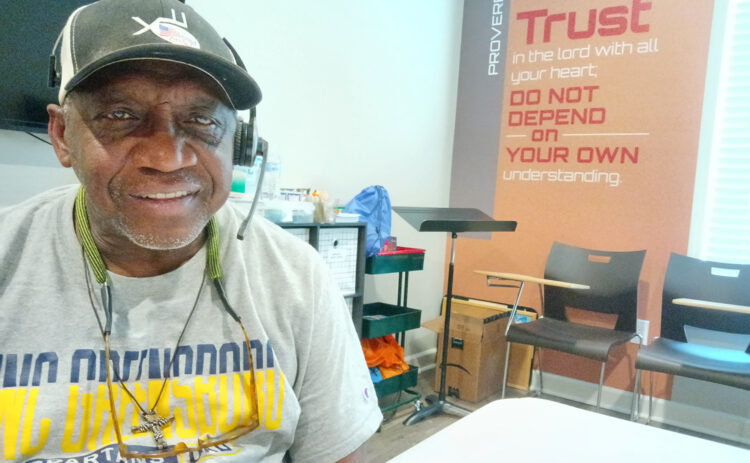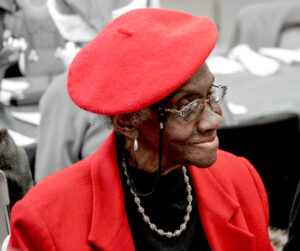
Rafford Miller
PROFILE | By Dave Yochum.
March 5. Rafford Miller once called Jetton Road in Cornelius home, as well as the very academic Davidson. His mom was the late Lula Bell Houston, the only person to have a building at Davidson College named after her while still living.
Rafford’s life is both old-school and contemporary.
Lula Bell, who worked in the laundry at Davidson College, moved Rafford and his brother and sisters into a sharecropper’s house on Jetton where Rafford worked on farms. The family later settled in Smithville, long before the historically Black community was annexed into Cornelius.
He has overcome addiction and learned from his time in prison.

Lula Bell
Indeed, for the past four years, Rafford has served others in and around the Smithville community. He is now a board member of the Smithville Community Coalition.
Rafford graduated from North Mecklenburg High School in 1971, and then graduated from North Carolina State—a very big thing for a kid from Smithville.
He landed a great job with the NC Dept. of Transportation, a job people in Smithville still talk about. The functioning cocaine addict managed a $10 million resurfacing job, and worked on the construction of I-277, I-77, W.T. Harris Boulevard and I-485.
His mother toiled day in day out at the laundry, washing bed sheets and clothing, befriending hundreds of students over the years.
But Rafford, pronounced Ray-ford, was convicted of possession with intent to sell and maintaining a dwelling for the purpose of selling drugs.
Between 1999 and 2000 he served eight months in prison.
During 2010 he served five months.
Between 2017 and 2019 he served two years.
So when Lula Bell died Nov. 24, 2017 at the age of 94, Rafford—no longer a shining star in a tight-knit and proud African-American community—was not allowed to attend her funeral.
“The moment I became aware that I would not be able to go to my mother’s funeral, was the moment I became clean. The thoughts, the desire to use—all went up in smoke,” Miller says from his house in Smithville.
Smithville community
Smithville is one of the oldest African-American communities in the region with roots dating back to the 1880s. Populated by former slaves and their children, the neighborhood was a strong community just outside Cornelius. The men of Smithville dug the trenches themselves to bring running water to the community.
The late Nannie Potts, the first Black mayor of Cornelius, was a leader in Smithville who Rafford admired.
Lula Bell—A legend
Many residents attended—and still do—Union Bethel AME Zion, Torrence Chapel AME Zion or Gethsemane Baptist Church in Davidson where Lula Bell was president of the Gethsemane Gospel Singers, a member of the Usher Board, the Missionary Circle, and taught Sunday School.
She was much beloved at Davidson College, having worked in the laundry for decades. According to Lula Bell’s oral history, she was the first Black staff member allowed to be the forward-facing check-in clerk at the laundry.
When her funeral procession wound its way from Smithville to Gethsemane in Davidson, people stood on the college grounds as the white caisson passed.
This is the lady Rafford let down.
“It was worse than a life sentence,” he says.
Rafford now
Since 2019 Rafford, now 71, has been a full-time volunteer at the Neighborhood Care Center on Smith Circle. Among other duties he helps with the lunches the all-scholarship Cornelius Early Scholars pre-school provides five days a week.
“He is a willing volunteer for just about any good deed,” says the Rev. David Judge of First Baptist Church where the Early Scholars have classroom space.
Rafford attends the Wednesday Men’s Prayer Breakfast every week.
And he’s back at Gethsemane where he’s been an usher for three years. He cherishes his relationship with sisters Peggy and Loria, and brother William.
But his driving force is the work of the Smithville Community Coalition, which is executing a neighborhood-led revitalization plan.
“I want to see the people that were my neighbors and friends, many of whom have been in poverty at some level, see the opportunities coming up that make a better place,” he says.
“For most of us this is the only home we have ever known.”
You can turn your life around.
“I was well-known as a wise guy, now I’m well-known for a different reason and people look out for me because I do just the opposite.”



